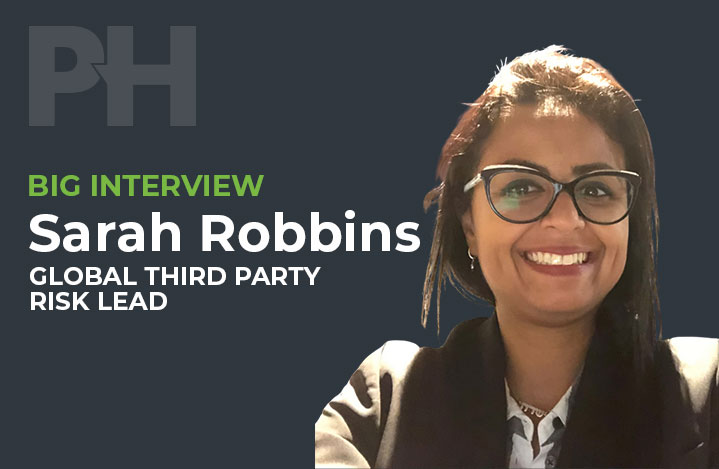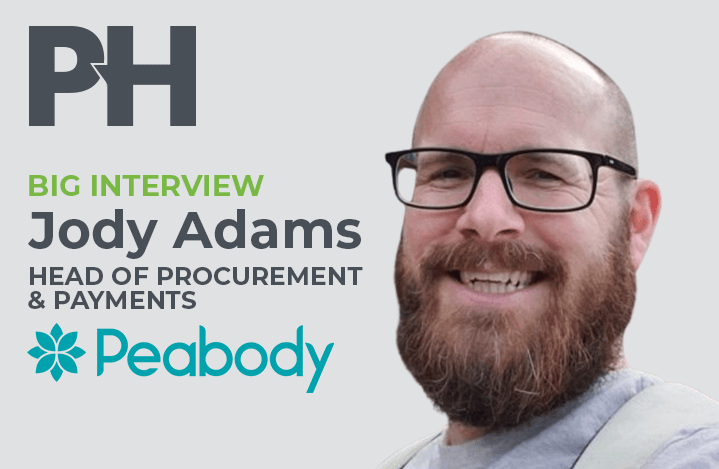For Procurement Heads‘ latest Big Interview, she spoke with David Hazeldine, Head of Practice for Procurement Heads’ Pharmaceutical offering.
When did your interest in procurement and risk management begin?
It’s a funny story!
I was studying international relations, so for me, I was on the way to becoming a Diplomat.
Suddenly, I heard about this internship at General Electric and decided to apply. I didn’t quite know what it was about but I thought it would be interesting, they wanted someone who was fluent in Spanish, which I am, so thought why not?
The role was as Procurement Intern and I thought the skillset was quite similar to what I was studying, so it was about negotiation, win-win and driving value to society and I thought that is exactly what I am looking for.
So I had a conflict at university as everybody wanted me to go and pursue the diplomatic area but actually, I fell in love with procurement.
I think risk management came to me a bit later in my career, it was specifically coming to the UK and being exposed to a developed market.
I think risk became part of the must-haves in everything we do. I did a lot of investigations in compliance, audits and things like that, but really when you see things like the financial crisis or the impact of a tsunami all this disruption in the supply chain, that is when you think about the role procurement has to play and we can be a bit more prepared.
I remember in GE we were always talking about business continuity plans, which is interesting when you think about resilience; I think all of the procurement things became about risk.
Coming from Brazil and from Latin America, which is still considered a high-risk region for certain activities, I think it was embedded throughout my career, you always think about bribery, corruption and transparency whenever you are dealing with your suppliers.
All of that was what inspired me to do what I do today.
Coming from a developing country – how did you manage to engineer your career away from being a regional procurement person into the global aspect?
It was a lot of perseverance, there are many things that explain that career path.
I was quite lucky to have leaders that really early in my career helped me to shape my longer-term career and I think executing that plan was quite critical and required a lot of perseverance.
Being a woman of colour does not necessarily help, you have to have a lot of determination and perseverance to get where you want to be.
I had a very amazing mentor who really saw the potential in me and helped me to navigate from a regional role to a global role.
There is an element of gravity, I call it gravity, because as you grow every now and then you get pulled down by comments but I think especially with procurement there is so much value with the regional experience.
I have had global roles for the last eight years but every time I am sitting at the global meetings I always think back to the idea of the region because ultimately they are delivering on the global strategy and I think that value is so appreciated by the region and by the leadership team in businesses.
Sometimes those nitty-gritty details that people will think about when they are executing are not necessarily visible unless you have that experience, so I think that also helped me to navigate through a regional role to a global role giving visibility of the value for that.
You have got to have a company that values diversity and appreciates the power of the collective is better than the individual, they have got to give you that platform to show your capability.
Absolutely and GE does that brilliantly to this date.
The forum, the nurturing of talent is focusing on your strengths.
I think when I was getting feedback on something, I think they call it unconscious bias, but back in the day, it was just feedback.
I remember my mentor saying, ‘You’re quite talented, you need to dare more, impossible does not exist, you are doing this very well in Latin America, take it globally’ and that is what I really believed and I think there is a lot of power in mentorship and having a leader that you can resonate with.
Third-Party Risk Management, ESG and sustainability, like supply chain, are often siloed into their own little areas in business, why do you think that is, shouldn’t it all be integrated?
Yes, and it is a very good point.
During my maternity leave, I reflected a lot about it because I think there are two things – one is that individually these functions historically have been a bit under-resourced and that in itself is a problem.
You can only keep the lights on so that in the past few years we have had in the UK and Europe Brexit, a pandemic and now we have a war – the question is how do you grow? Where is the grass greener?
I think what happens is that there is an element of people and technology.
Historically we have been pushing for transparency payment in processes and the integrity of the process but I think now is the time to take this forward and say ok if my supplier is placed in a high-risk region what is the impact for me – so this is a risk but it is also sustainability because it is looking at the political risk but it is also important for the enterprise risk and the brand value of the company because this is human rights – it all comes together.
I don’t think it is there yet, but I think with time and as we evolve through these crises that we are going through, worldwide technology has a key role to play to give the transparency that we will allow these three functions to work better together.
What are your thoughts about how risk and sustainability are linked?
You have to take a step back and reflect on what is risk and what is sustainability.
When we talk about risk, we are usually talking about protecting the company from a financial or brand perspective so reputation.
I think with the world evolving this reputation aspect is increasing, which means you need to look at things such as labour loss, human rights in general and your commitments.
Companies all over the world are making serious commitments to decrease their carbon footprint, then you think is this risk or is this something else?
In my view it is both – it is looking at risk with the sustainability lens.
You need to look at selecting a supplier that is on board with your strategic commitments. If you are onboarding a supplier, it is good for you to get awareness of where that supplier is going with their sustainability commitments. Then when you are evaluating the performance, are they going to meet or are they similar to what we do – are we talking the same language here?
I think the key is to put sustainability in the DNA of risk management, rather than the other way around.
I don’t see sustainability as a risk, I see it as the framework of where the risk comes from.
Why are you such an advocate for sustainability?
It is something that has become quite close to my heart, I think coming from Latin America what happens is that when you are in a growth market and when you are in a market that is exposed to a certain risk such as bribery and corruption.
Partnership and collaboration with third parties is the way to go because in some instances you have to explain what is right and what is wrong.
So they can take a step back and understand the impact on society and ultimately that is what it is about.
I remember in Latin America selecting suppliers already thinking of female representation. We would ask the question and when we were deciding and we would influence the business by saying a supplier was not only aligned with cost but was also giving back to society.
I think now in the past five years I can see a lot of sustainability being talked about in the UK and Europe, but if you go to countries in Africa or countries in Latin America, such as Brazil, I think you will find that people are already executing more sustainable procurement processes because it is the only option there as it is already interlinked with your brand.
It is impossible not to feel passionate about such an interesting function, that is what makes procurement so sexy for me, that sustainability aspect that you can say you are doing something that is really positive and changing the world.
In attracting talent I think procurement has grown so much in the past 10 years, people used to not know what it was but now procurement is a hot topic. Especially thinking about the next generation of leadership.
I think it is about inspiring them to keep that agenda and I think with what we have seen in the world, especially with the pandemic the resilience and that motivation to wake up in the morning comes from doing something more – doing what we can to make the world a better place right.
Procurement plays a key role in that agenda.
It is also about inspiring the next generation of procurement and showing people in other functions that procurement plays a big role in this.
What do you think the future of ESG and sustainability look like with supply chain management?
There are three things, technology, depth and transparency in reporting.
I think that technology, in my experience, plays a role to bring to the surface what works and what doesn’t.
Historically a lot of the processes have been quite manual but I think bringing technology will let us see where we are with what we do.
The next thing is depth – it is not just about reporting on the net-zero but it is about what is the impact of that? And how is that shaping a new governance model within the company, I think there is that element of depth.
Finally, transparency – I think in the short term you see a lot of commitments and measurements and people reporting but I think with time these numbers will be held accountable so transparency is quite an important element of this framework and whenever people ask me about how I see the future I think these three elements are not the only ones (I’m open for debate find me on LinkedIn with additional ideas as I am quite passionate about this topic!) but these three are coming back as a cycle in my mind.
How technology can play a role to drive more transparency and I think we will be held accountable for that in the future.
I think it is an evolving process, what I see is that, especially with more companies and start-ups, they are starting to think about it – they don’t have the answer but the most important thing is to have the first step and for big companies to be open and humble in terms of how their partners are doing, you don’t have to have all the answers.
The way I think about it is positive competitiveness.
Everyone wants to be successful and hopefully, we can all save the world!
How do you find it being a female leader in procurement now compared with when you first entered the profession?
Totally different, it is a whole new world.
I remember in Latin America, our target in the office was heavily focused on gender, so we used to have a lot of women in leadership positions and I remember we had a CEO that was a woman so that leadership was a good environment.
When I crossed the ocean what I found was that I was actually the only woman, I thought that was interesting.
It was not unusual to be the only woman of colour but it took me some time to think – oh, that is where we are here. When you are at a regional level you may find more diversity than when you actually go to the global level.
I started to feel that the more you grow the less representation you may find, but I think this is changing now, especially in procurement where you see lots of amazing female CPOs and their names are being talked about, which helps to drive that representation – that is so important.
The way I see it is not as a niche, I see it as an opportunity.
We may not know the answers, diversity may come with its challenges but all I can do as a leader is make sure that I inspire other female colleagues.
Who has inspired you in your career and why?
So many people but there are a few names that I thought of, our friend Tania Mijas is an ongoing figure in my life, she was featured in the Harvard Business Review as a champion for Latin America as a woman and if you read the challenges she has been through – I was working with her and I didn’t even know!
I think my mentor David Vandeven, he is retired now, but David was the General Manager of Procurement for GE health care for many years and he made history. He was my mentor, a father figure, I don’t even know that he realises the inspiration that he was for me. And the honesty in procurement, he was there to represent healthcare, that was nice to see.
Maria DiPietro and Paul Whitaker. Maria is in America now but led procurement in GE in the UK she was decisive, I think that decisiveness and sometimes being demanding and wanting more and being ambitious, Maria and Paul both taught me that.
More recently I am absolutely in love with what I read coming from Jayne Massey about sustainability, I think Rachel Legg as the CPO of Johnson Matthey as well is amazing everything she posts about Equality and Diversity, I love it.
Also our dear John Dickson, your interview a couple of months ago! It is an inspiration to be in his organisation today.
There are lots of good people out there.
I think in some functions you can deal with people who are highly talented but you wouldn’t necessarily have dinner with them.
But, in procurement, because the tension can get so heavy it is also good to meet people that you make friends with for life – that personal interaction is so important.
What advice would you give someone who wants to start a career in procurement and influence sustainability and ESG?
I would say many things!
I think that one thing is to challenge what you hear and do not accept anything as of right or wrong.
If anyone is joining procurement or sustainability now nothing is set in stone, you have the ability to build your own so leverage your learnings and your ability to research.
Leverage your degree and bring it to the business.
I think the positive challenge is making sure that you don’t take the first thing you hear as true.
When I joined I used to think that everyone knew the answer so I wouldn’t ask the question, but I think today the world has evolved so ask, make the freedom we have an advantage!
And if you don’t agree with the answer, ask the question again!
If you’ve been inspired by reading Sarah’s Big Interview and would like to take part in the series and share your procurement or supply chain insight, click here to get in contact.






